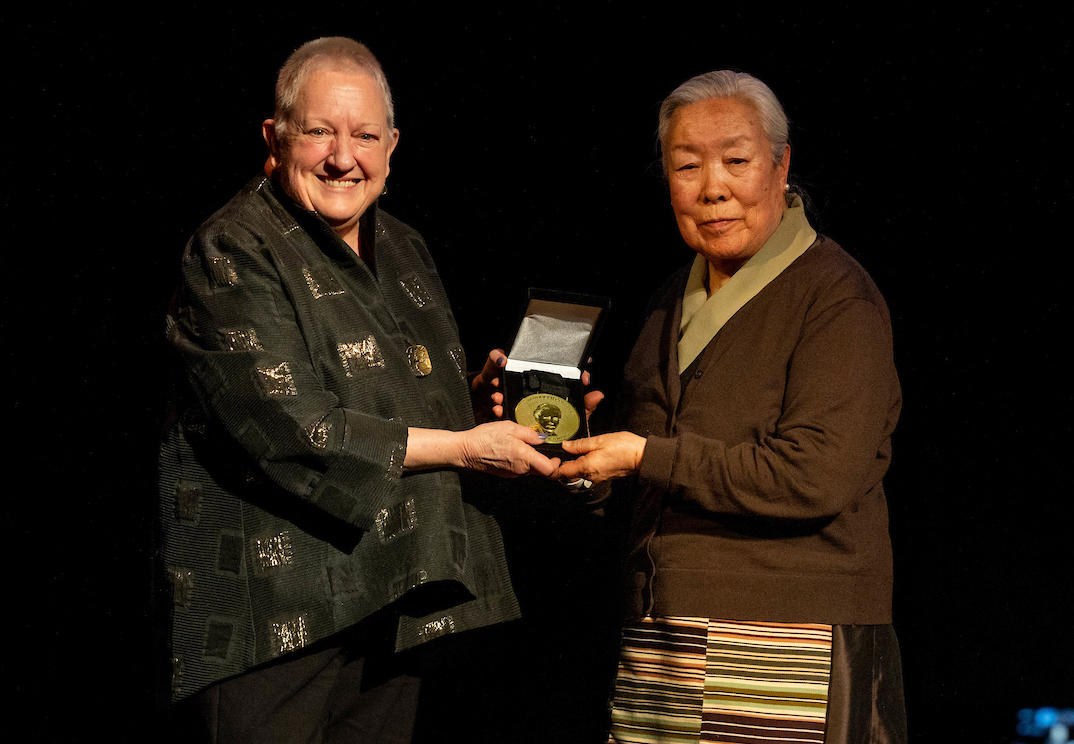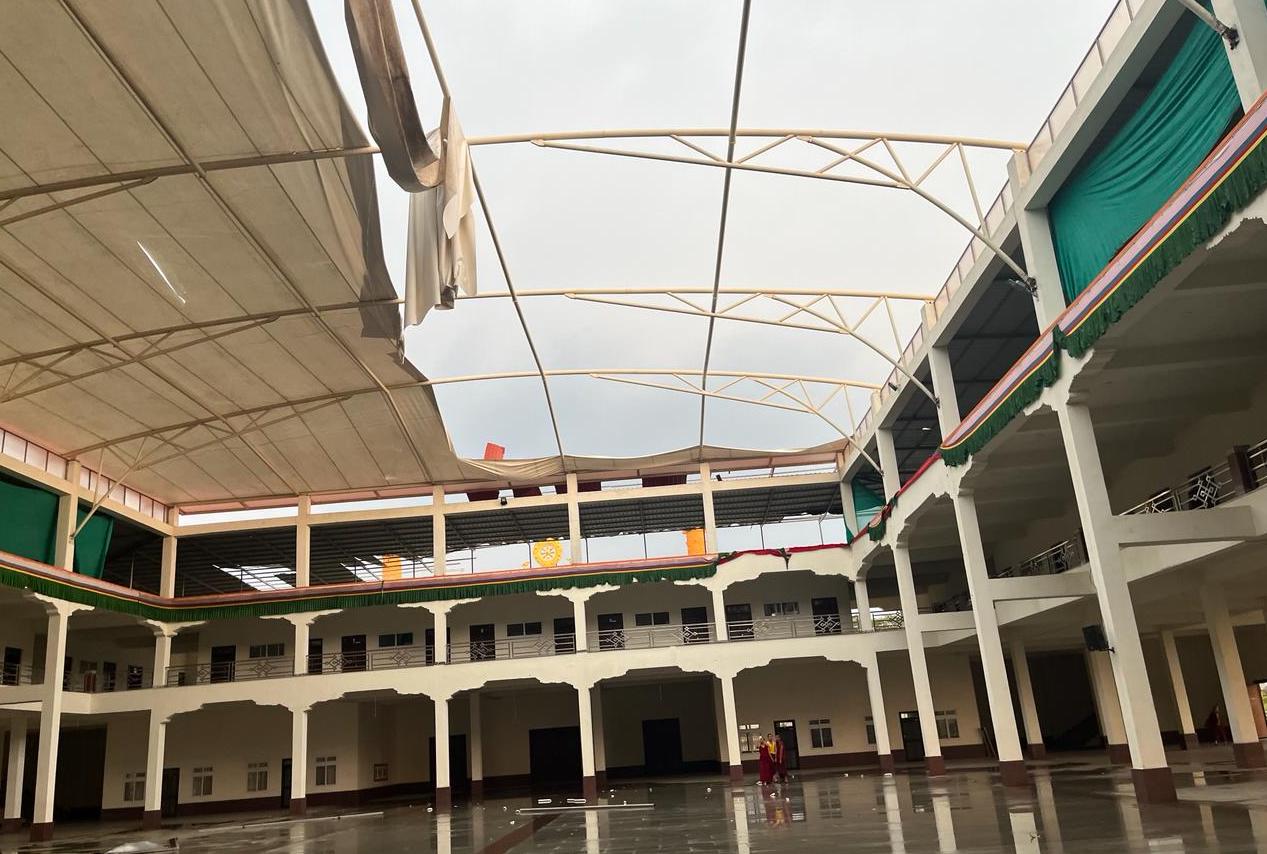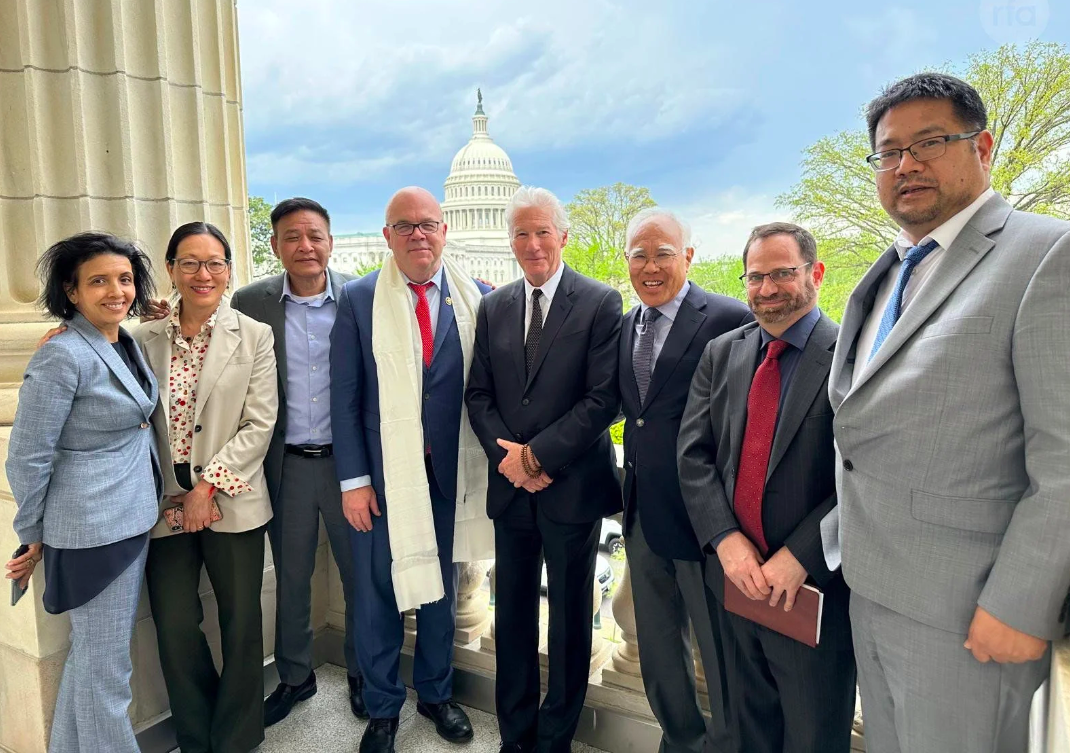Hundreds sought out peaceful Buddhist karma when Tibetan monks visited Savannah last month.
By Ann Stifter
The crowds hunted for harmony and healing.
Hundreds found it watching Tibetan monks silently craft a sand painting in a downtown museum.
Then, they followed that feeling to the Savannah River to see the Buddhists pour their creation into the water for communal blessings.
Others rushed to lectures on mental balms.
Always nearby was Murray Silver, an author who recites Buddhist chants in his Savannah home and doubts that same crowd will show up for follow-up classes on his religion, a philosophy that requires practice and doesn’t worship God.
“While the monks were here, people become excited about what’s going on,” Silver said. “As soon as they’re gone, they have to draw only on themselves.
“Their interest goes somewhere else and there’s nothing to sustain it.”
What Silver saw in Savannah last month was typical, he said: people searching for an authentic spiritual experience, thinking they found it in the Tibetan Buddhist movement, showing passion, following the monks, but not committing.
Yet, locals appear more interested in Buddhism now than when the monks last visited five years ago, he said.
And for those who asked for more information on the mind-body connection this time around, Silver is having a Tibetan Buddhist monk travel from Atlanta to Savannah to teach the faith.
The monk, Lama Shedrup Gyaltsen, will direct believers deeper into a philosophy that includes meditation and controlling emotions and behaviors.
If only several people show up, Silver said he will be glad.
Why be Buddhist?
Buddhism was founded in India about 525 B.C. by Siddhartha Gautama, called the Buddha, long before the births of Jesus Christ, who Christians follow, and the prophet Muhammad, the founder of Islam.
Eric Reinders, assistant professor in East Asian Religions at Emory University, finds it hard to generalize the attraction to it.
“Particularly because the Buddhism being presented to them is, to some extent, tailor-made or customized to Western audiences,” he said.
Reinders suspects the religion is growing slowly in the United States.
“Even some churches teach Buddhist meditation,” he said.
To worship, faithful may choose among 17 Buddhist temples in Georgia, four in South Carolina or 1,656 in the United States, according to a study published in September by the Glenmary Research Center in Nashville. It was the first time the study included Buddhism.
People sometimes are drawn to the religion when it’s presented as an atheistic, rational psychology, Reinders said.
Others like the meditation.
Some Americans don’t want to be told what to believe and perceive Buddhism as having no dogma.
It’s also hard to generalize among different Buddhist groups.
The political situation in Tibet, for instance, has encouraged the spread of Tibetan Buddhism in the West.
“The fact that so many Tibetan monks fled out of Tibet meant they would travel throughout the world more,” Reinders said.
“I’m not saying they get into Tibetan Buddhism for political reasons, but political reasons are why Tibetan Buddhism became internationally known, because they were forced out of their country.”
The Dalai Lama, the religious leader of Tibetan Buddhism, fled Tibet in 1959 with thousands of supporters after a failed uprising against China. Since then, he has headed a government-in-exile in north India and won the 1989 Nobel Peace Prize for his nonviolent struggle against Chinese rule of his homeland.
Whatever the reason, Liz Gunn, co-owner of Moondance, a mind-body-soul store and center, will host the monk. The first of five classes begins Saturday.
“People, through what they experienced (last month), are interested for more about the Buddhist philosophy and what it preaches, compassion and non-attachment and unconditional love,” Gunn said.
It doesn’t preach God.
“Buddhism tells you at the outset there is no god,” Silver said. “I think this is where Buddhism finds its most difficult aspect in being accepted in the West.
“They will say there are energies, but will stop short at saying there is a creator God in the Judeo-Christian sense.”
Buddha was not a god, but a spiritual guide.
When Silver brought the monks from India to Savannah last month to spread healing energy through art, dance and talk, he also helped some residents meet the elder lama, a healer, to alleviate their diseases.
Yet, a tenet of the self-reliant faith is giving credit to the believer, not the healer.
Monks don’t cure the sick, Silver said. They only enable people to believe in good health, to heal their bodies by working on their minds.
As Silver practices Tibetan Buddhism, a leader of the local Vietnamese Buddhist temple has noticed a slight increase in interest in his faith, which differs from the Tibetan philosophy.
Although services are not obligatory, about 30 people attend Sunday worship in the Garden City temple each week. Of those, two or three are American. Most are either Vietnamese or Chinese, said An Nguyen, president of the Buddhist Association of Savannah.
Each month, Nguyen receives several inquiries about his religion.
“It’s more and more than it used to be. They come and go,” Nguyen said. “A lot more young people are interested.”
He invites them in, but tells them services are in Vietnamese and that the educational classes have been cancelled temporarily because of time constraints.
To smooth communications between Americans and Asians, the temple’s religious leader, a nun from Vietnam, is learning English at a Savannah college.
Nguyen believes people seek Buddhism because they’re busy.
They think too much.
They’re always wondering what to do tonight and how they’ll pay the bills.
They want peace.
Buddhism teaches how to slow down, concentrate on the present, not dwell on the past or fret about the future, Nguyen said.
It’s about focus and eliminating distractions.
“In Buddhism, we feel you only can do yourself, nobody can help you.” Nguyen said.
“I only believe in myself. You have to change the mind, the way you do things.”
“You understand the reality and it helps you enjoy. You’re happier than people who worry so much about the past and future.”
Events:
What: Lama Shedrup Gyaltsen, of Drepung Loseling Institute in Atlanta, will lead a series on the essential elements of Tibetan Buddhist philosophy.
Where: Moondance Center, City Market
Cost: $50/class; helps cover expenses and helps the Drepung Loseling Monastery.
Registration: Pre-registration and payment required.
Contact: 236-9003 or www.moondancecenter.com Class Schedule:
Feb. 22 — Shamatha, meditation for cultivating focus and inner clarity.
March 8 — Trishiksha, freedom from negative emotions and behaviors.
March 22 — Lam-tso Nam-sum, the three principal aspects to the path to enlightenment.
April 5 — Kyabdro, meditation for entering the path of inner development by taking refuge in the Three Jewels of Buddha, Dharma and Sangha.
April 19 — Guru yoga, spiritual bonding with one’s Spiritual Teacher.
Time: All classes are 1-5 p.m.
About Lama Shedrup:
Born in Bhutan in 1969.
Entered Drepung Loseling Monastery in south India for advanced training in Buddhist philosophy, psychology and metaphysics.
Received full ordination from the Dalai Lama in 1994.
Sent to North America in 1999 to serve as spokesman for the Mystical Arts of Tibet tours.
In 2002, became resident teacher for Drepung Loseling Institute, Atlanta (an affiliate of Emory University and the North American Seat of Drepung Loseling Monastery).
Ann Stifter can be contacted at astifter@savannahnow.com, 912-652-0332









